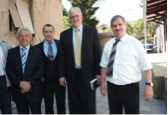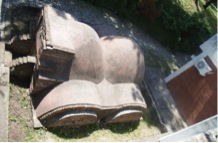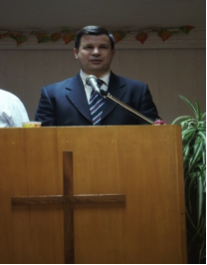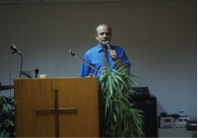Serbian Baptists remember the Edict of Milan
Serbian Baptists remember the Edict of Milan
The pivotal role Roman Emperor Constantine played in the growth of the Christian faith featured in a recent conference hosted by Baptists in Serbia – including the fact that his influence has yet to be fully realised in much of Eastern Europe.
When Constantine, who was born and raised in the southern Serbian city of Nis, ruled Rome, Christianity became the dominant religion of the Roman Empire.
A major feature was the Edict of Milan in 313 when Constantine and Licinius, who controlled the Balkans, agreed to treat the Christians benevolently. Prior to that they had suffered two and a half centuries of persecution.
Last month's conference hosted by the Union of Christian Baptist Churches in Serbia marked the 1700th anniversary of this Edict. Christian liberty from a Biblical and historical perspective was the main topic.
 The main speaker John Upton, president of the Baptist World Alliance, encouraged those gathered, and spoke on what liberty means to Christians. Dr Goran Golubovic, professor of Philosophy from the University of Nis took delegates back to the time of Emperor Constantine.
The main speaker John Upton, president of the Baptist World Alliance, encouraged those gathered, and spoke on what liberty means to Christians. Dr Goran Golubovic, professor of Philosophy from the University of Nis took delegates back to the time of Emperor Constantine.
 They also had the chance to visit important areas in Nis. These included the home of Constantine and Nis Spa, the site of an early Christian tomb where 14 Christians were buried underground after being tortured and killed in the 1st Century. After the Edict of Milan Constantine ordered that tombs must be discovered and those killed proclaimed martyrs for Christ.
They also had the chance to visit important areas in Nis. These included the home of Constantine and Nis Spa, the site of an early Christian tomb where 14 Christians were buried underground after being tortured and killed in the 1st Century. After the Edict of Milan Constantine ordered that tombs must be discovered and those killed proclaimed martyrs for Christ.
Despites these huge steps forward for Christians at the time, it was recognised that generally the Edict of Milan still needs to be 'fully realised concerning the work of Protestant churches in many countries in the Eastern part of Europe, including Serbia', said Cedo Ralevic, president of the Union of Christian Baptist Churches in Serbia.
Nevertheless, our hopes come from Christ, not an Edict.
'We as Baptists have hope that when the message of Christian liberty and tolerance is being heard, that we as the minority of the minority called Baptists can be understood and regarded as a church who proclaims the Lord Jesus Christ as only true God and Saviour,' said Mr Ralevic. 'The main goal of the conference and celebration was to proclaim freedom in Christ, not to exalt the Edict itself although we believe it was God's hand in it, and that we as Baptists can be heard in Serbia. No edict can bring us freedom like God brought us through His son Jesus Christ as He says in John 8:31-32 “If you hold to my teaching, you are really my disciples. Then you will know the truth, and the truth will set you free.”
 Those gathered included Vitaly Vlasenko from the Russian Baptist Union and Ákos Bukovszky from Hungary, as well as Dane Vidovic, General Secretary of the Baptist Union of Serbia North and 60 people from all over Serbia.
Those gathered included Vitaly Vlasenko from the Russian Baptist Union and Ákos Bukovszky from Hungary, as well as Dane Vidovic, General Secretary of the Baptist Union of Serbia North and 60 people from all over Serbia.
 The conference prayed for the people around the world who are still being persecuted for Christ's sake. 'We prayed together at the conference that freedom in Christ can be known first of all in the hearts of people and than in practice in any aspect of life whether it be political or religious,' said Mr Ralevic.
The conference prayed for the people around the world who are still being persecuted for Christ's sake. 'We prayed together at the conference that freedom in Christ can be known first of all in the hearts of people and than in practice in any aspect of life whether it be political or religious,' said Mr Ralevic.
He also asked that Baptist pray that Christ may reign in Serbia and that His Word might be preached, 'not religion but His Word!'
'Pray that the voice of Baptists as minority can also be heard and that we may be regarded as a Church that belongs to God, through Jesus Christ our Saviour. 'Let this message be heard in Serbia and throughout the world!'
Photos: The Union of Christian Baptist Churches in Serbia